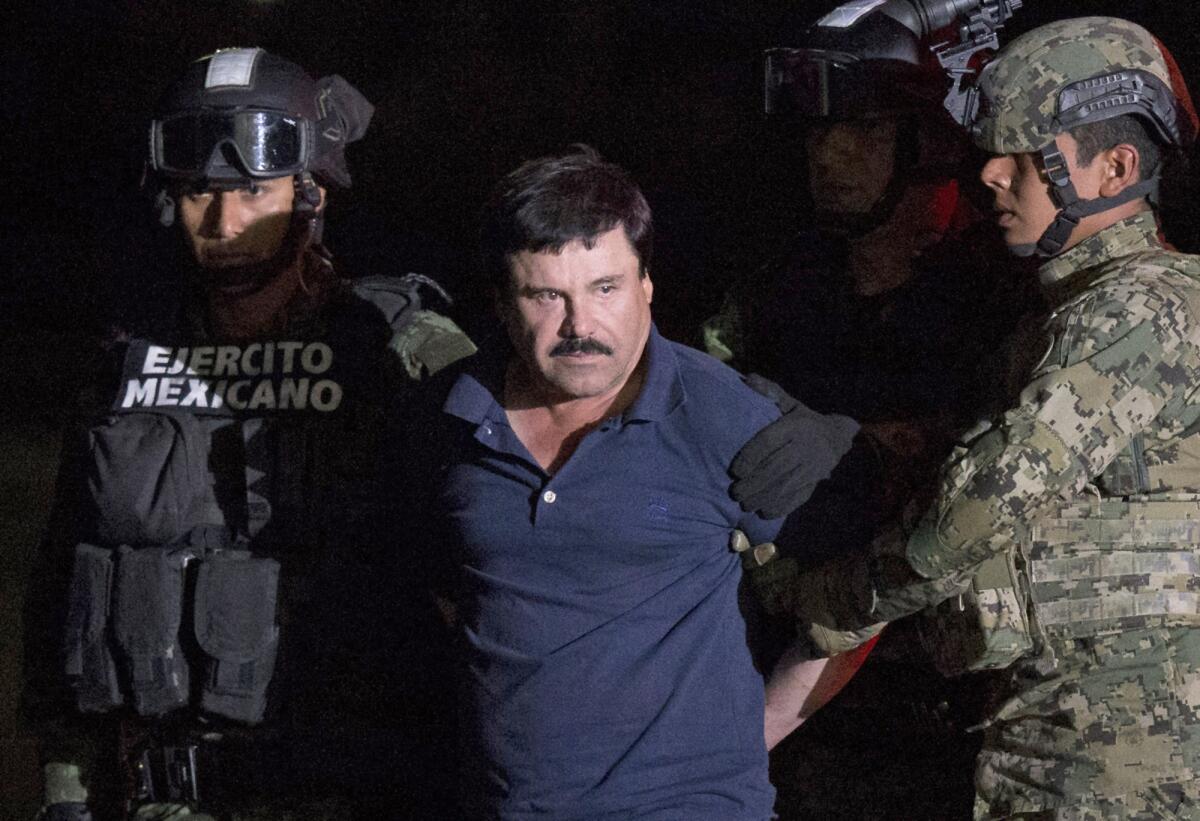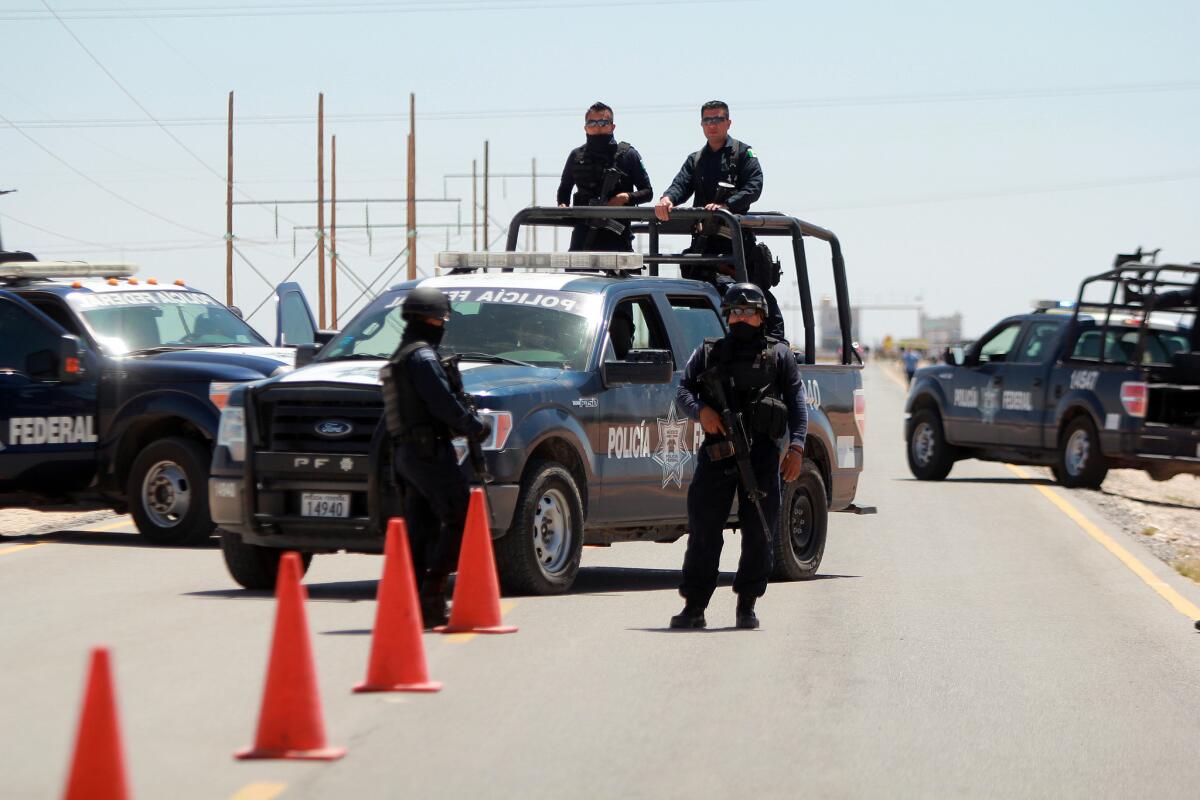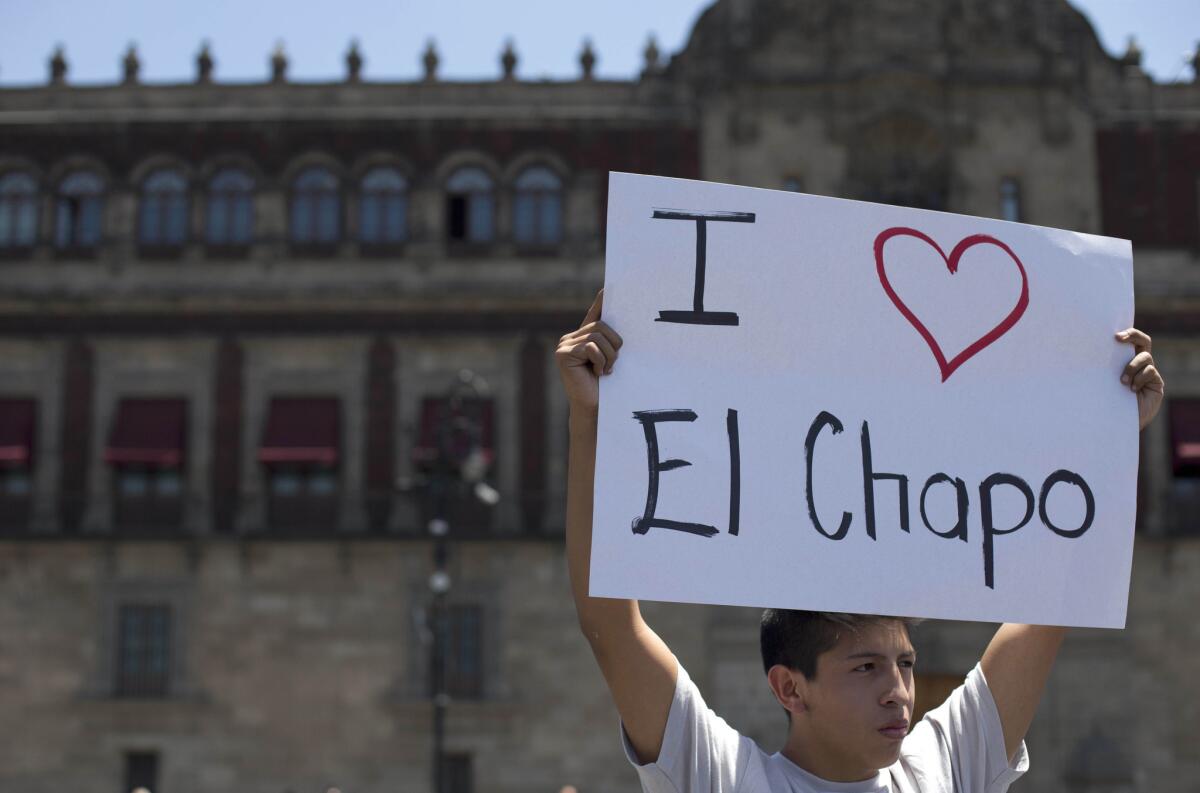Bringing El Chapo to the U.S.: Secrecy, high security and swiftness

Mexican drug lord Joaquin “El Chapo” Guzman is escorted by army soldiers to a waiting helicopter in Mexico City on Jan. 8, 2016, after he was recaptured.
- Share via
Reporting from Houston — Bringing Sinaloa cartel chief Joaquin “El Chapo” Guzman to American soil could take years, but once the process starts, it will probably be lightning quick and as scripted as it has been for other extradited drug lords, terrorists and fugitives.
It took eight years to extradite radical London cleric Abu Hamza Masri and four other terrorism suspects to the U.S. in 2012.
It took nine years to extradite Tijuana drug lord Benjamin Arellano Felix to California in 2011, where he pleaded guilty to racketeering and conspiracy to launder money and was sentenced to 25 years in prison.
And Vincent Legrend Walters, a San Diego drug trafficking and murder suspect who was on the U.S. Marshals Service’s 15 most-wanted list, was caught four years ago in Cancun, Mexico, and is still awaiting extradition.
“A lot of times these things just don’t happen as fluidly and timely as you would expect,” said William Sorukas, recently retired chief of international investigations for the Marshals Service.
Now that Mexico has cleared the way for Guzman’s extradition -- though he has appeals that could slow the process by months, even years -- the Justice Department is probably discussing how he will be moved, where he will be locked up, where he should be prosecuted and what jurisdiction has the most robust case, Sorukas said.

Given Guzman’s track record of escaping, security will be a concern. Guzman has twice broken out of Mexican prisons, meeting with actors Sean Penn and Kate del Castillo while on the lam before he was recaptured in January.
The Marshals Service handles 700 to 1,000 removals a year, including extraditions and deportations, about 300 of them from Mexico, where the agency has employees who coordinate with the government, according to Denis Donovan, chief of international investigations.
Until May 7, Guzman was held at the Altiplano prison outside Mexico City, where he was able to visit with attorneys and relatives. Under 24-hour surveillance, he had trouble sleeping and developed hypertension, which required medication, his attorney said.
Guzman was apparently surprised when authorities transferred him to the maximum-security prison in Ciudad Juarez, across the border from El Paso, Texas.
“He believed he was headed for the United States until he arrived at the prison,” Jose Refugio Rodriguez, one of his lawyers, said.
Once Guzman exhausts his appeals, Mexican officials said, they would refuse to extradite him to a state where he would face the death penalty. Mexico has abolished capital punishment and regularly seeks assurances from U.S. officials that extradited Mexican citizens will not face execution.
“The solution in the past has been a promise by the prosecutors that they would not seek the death penalty,” said Ignacio Pinto-Leon, assistant director of the Center for U.S. and Mexican Law at the University of Houston.
That seems to be the scenario unfolding in Guzman’s case. In announcing its decision to approve his extradition to face charges in California and Texas, Mexico’s Ministry of Foreign Affairs said last week that it had received “sufficient assurances” from Washington that Guzman would not face the death penalty in either state.
Guzman has a month to appeal the Foreign Ministry’s decision, which his lawyers have said they plan to do.

Guzman faces a mix of federal drug trafficking, kidnapping and murder charges in California, Florida, Illinois, New Hampshire, New York and Texas. Some charges require that he be extradited directly to Florida or New York to establish venue, officials said. So far, Mexico has approved only extradition requests from California and Texas.
Mexican officials could also insist that Guzman be extradited to a particular locale under the “rule of specialty.” They could also specify that he not face murder charges, which were brought in New York and Texas.
Federal prosecutors have been jockeying for the case, with those in Brooklyn and Miami joining forces and expected to win.
According to a new indictment filed May 11 that updates drug trafficking and murder charges filed against Guzman in Brooklyn, N.Y., the U.S. attorney in Miami has been added as special counsel there.
“They have a staff meeting, everyone sits down and pitches their case, and they try to get Justice to say you’re going to this particular locale,” said David Weinstein, a former federal prosecutor who oversaw the narcotics division at the U.S. attorney’s office in Miami.
FULL COVERAGE: The saga of ‘El Chapo,’ one of the world’s biggest drug kingpins>>
Atty. Gen. Loretta Lynch, who led the Brooklyn office when charges were filed against Guzman and is expected to decide who gets the case, met with federal prosecutors in Miami this spring, Weinstein noted.
“They also have to consider where you’re going to house him,” he said.
Former Gulf cartel leaders Juan Garcia Abrego and Osiel Cardenas Guillen are housed at the penitentiary in Florence, Colo., one of the few top-security prisons nationwide – but those are reserved for prisoners who have been convicted.
Until trial, Guzman would be housed at a federal detention center. In New York City, the detention centers are designed for “the containment of extremely dangerous, violent or escape-prone inmates,” according to the U.S. Bureau of Prisons, with tunnels guards used to transport prisoners to the adjacent federal courthouses. (There are similar tunnels connecting the federal detention center and courthouse in San Diego.)
Del Castillo, the Mexican actress who met with Guzman before his capture, has said she’s looking forward to visiting him once he reaches the U.S.
“It will allow my team greater access to him in order to tell a full and accurate picture of his unbelievable life and work,” Del Castillo said in a statement.
Weinstein called that “a pipe dream.”
“The only way you can get into a detention center is if you’re the attorney, and you have to get cleared to get in, or if you’re a relative, a blood relative,” he said.
Once it’s time to extradite Guzman, he will probably be flown -- not driven -- into the U.S., Weinstein said. The move from Altiplano to Juarez lasted from 9 p.m. to 3 a.m. and involved an airplane and a helicopter.
The move to the U.S. probably won’t be announced until it’s complete. “The risk of somebody disseminating that information and facilitating an escape is just too great.”
Even those transporting Guzman probably won’t know in advance, he said.
“They’ll get a call: You’re going to go somewhere and do something. Then they’ll realize, ‘Oh, I’m one of the few who got selected to be on a plane with El Chapo,’ ” he said.
It’s unclear which federal agency would transport Guzman – the Drug Enforcement Administration, FBI or U.S. marshals. Although they may use a military base for flights, service members will not be involved in the extradition, Weinstein said, because that could be used as grounds for an appeal.
Mexican officials moving Guzman closer to the U.S. this month actually made it more difficult to extradite him, some experts said, because Juarez has long been dominated by his cartel.
“It’s dangerous to get him to the airport even from the prison,” said Gary Hale, former chief of intelligence at the DEA Houston office, who retired six years ago.
Hale said officials prefer to fly extradited prisoners out of the presidential aviation area at the Mexico City airport, guarded and secured with barricades.
“They can have him in Houston in an hour and a half from Mexico City. Putting him near the border doesn’t mean anything in terms of bringing him to the U.S., because driving him is high risk, especially when you’re going through downtown Juarez, stronghold of the Sinaloa cartel,” Hale said.
If the DEA handles an extradition, usually the pilot and crew have some advance notice to prepare for customs, he said.
The Marshals Service always sends at least two staffers to extradite someone and, in this case, may add medical personnel, Sorukas said. Although it has employees stationed in Mexico, iit tries to send officials from the destination city, he said, either federal marshals or deputized detectives.
During the trip, investigators can record spontaneous admissions by the suspect or even question him, as long as he’s first read his Miranda rights, Sorukas said.
In some cases, U.S. officials have little control over how Mexican counterparts decide to transfer prisoners, especially cartel leaders they want to take credit for capturing.
Cardenas Guillen, known as “El Mata Amigos,” or “The Friend Killer,” was flown to the U.S. by the Mexican military on short notice. The Mexican attorney general’s office later released photographs of soldiers leading the handcuffed kingpin from the plane.
“They made a snap decision: OK we’re extraditing him, where do you want him? And all of a sudden he was landing in Houston,” Hale said. “El Chapo could be very similar because they don’t want to reveal their plans.”
See more of our top stories on Facebook >>
MORE ON EL CHAPO
Mexico OKs extradition of drug lord ‘El Chapo’ Guzman to U.S.
Mexico transfers drug lord ‘El Chapo’ to a prison in Ciudad Juarez
Boxer Fernando Montiel recounts his brush with El Chapo’s capture
molly.hennessy-fiske@latimes.com
Twitter: @mollyhf
Hennessy-Fiske reported from Houston and McDonnell from Mexico City. Staff writer Del Quentin Wilber in Washington contributed to this report.
More to Read
Sign up for Essential California
The most important California stories and recommendations in your inbox every morning.
You may occasionally receive promotional content from the Los Angeles Times.













